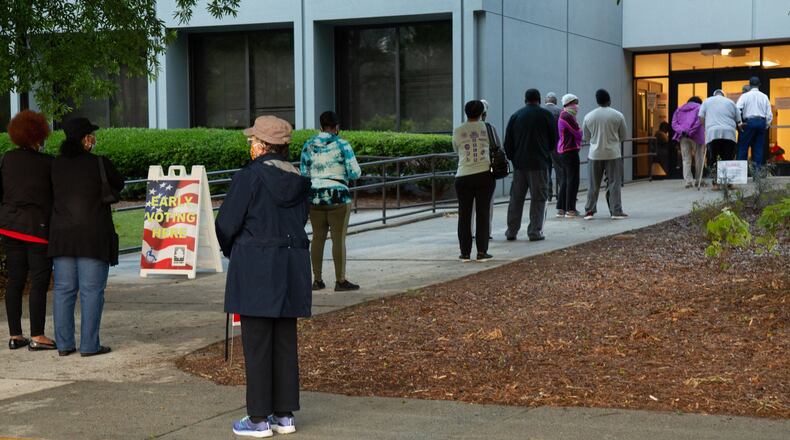Georgians planning to vote in person next week for the June 9 primary could face long wait times — and not just because of the coronavirus.
A surge in the state's voter rolls over the past decade combined with poll closures or consolidations due to the removal of federal oversight of polling changes is now exacerbated by last-minute poll closures, relocations and social distancing measures.
According to a February report from the secretary of state’s office, 2,377 polling places were slated to open across Georgia for the presidential primary in March.
» COMPLETE COVERAGE: Coronavirus in Georgia
Next week, there will be nearly 80 fewer places to vote in the greater metro Atlanta area, home to the bulk of the state’s voting population and largest minority communities.
Statewide, more than 10% of polling places have been relocated since the pandemic.
When Lutheran Church of the Redeemer in Midtown Atlanta became unavailable as a polling place, Fulton County elections officials combined two precincts that voted there with three other precincts that voted at Grady High School — until the school also became unavailable.
The result: Nearly 16,000 active registered voters from those five precincts are assigned to vote at Park Tavern, a restaurant and event space at the edge of Piedmont Park.
While not every voter will cast a ballot there June 9, even a fraction of that number could result in logjams at the polls because of health precautions in place to protect voters.
A combined 8,000 residents of Grant Park, Summerhill and Mechanicsville are to vote at the long-closed FanPlex adjacent to the Georgia State stadium after their original three locations became unavailable.
Fulton has approved emergency voting location changes for about a fifth of the 198 polls originally planned for June 9, which will impact about 250,000 voters who could cast their ballots at an unfamiliar location.
Senior centers, schools and churches that were slated to be used as polls for the primary have since become unavailable for reasons including COVID-19 concerns and scheduling conflicts because of renovations.
All told, the county lists 45 polling places that have been moved. In some cases, already-large precincts have been consolidated into polling locations that serve more than 10,000 registered voters.
A Georgia News Lab analysis found that 62% of the planned polling places in the state pre-pandemic state were churches, schools and other private buildings, and the reliance on non-public polling locations is most prominent in metro Atlanta.
Even a small number of voters at the polls can lead to a long line, elections officials and voting rights groups say.
During the first day of early voting in Fulton County, wait times topping two hours were reported with around 600 total voters, prompting the county to expand hours and shift to larger spaces within the polling places.
“The longest lines that we’ve seen in Fulton County were at C.T. Martin and South Fulton,” Cindy Battles, program coordinator with nonprofit Common Cause Georgia said. “There were 20 people ahead of me [at C.T. Martin] and I waited in line for an hour to vote.”
Problems with voting, particularly long lines, tend to affect poorer, non-white voters, Battles said.
“I don’t know that someone deliberately set up the system so that it would disproportionately impact people of color,” she said. “But a lot of decisions that we make wind up impacting lower-income communities and people of color simply because of the way the system works.”
The decision to add or subtract polling places is made at the county level, especially since Shelby V. Holder, a 2013 U.S. Supreme Court ruling that removed federal oversight from alterations to elections made by some jurisdictions, including Georgia.
In the years since, 10 counties around Atlanta have added more than a million voters to the rolls, about half of all the new voters registered in the state. Yet six of those 10 counties have eliminated nearly 10% of their polling places since 2013.
» RELATED: Virus concerns close churches, other voting sites for Georgia primary
» MORE: Precinct closures harm voter turnout in Georgia, AJC analysis finds
Now, because of the coronavirus, DeKalb County alone is consolidating more than 20 polls for the June 9 primary.
Two precinct consolidations in Doraville mean 9,300 active voters — the majority of them non-white — are temporarily assigned to vote at a single location.
The increased burden on polling places is not limited to counties that have fewer voting locations. Gwinnett County has added nearly 170,000 active registered voters since 2012 without increasing its 156 polling places.
In the hotly-contested 2018 governor's race, a federal judge ordered the Annistown Elementary School precinct near Snellville to stay open until 9:25 p.m. after technical issues with the check-in system led to some voters waiting upwards of three hours in line before casting their ballots, the AJC previously reported.
That majority-black precinct has grown nearly 50% since 2012, and currently has about 4,000 active registered voters assigned to vote there.
Seven of Gwinnett County’s 156 precincts have more than 6,000 active registered voters. All but one of the seven have polling locations in majority non-white areas of Dacula, Duluth, Lawrenceville and Loganville.
Saira Draper, voter protection director with the Democratic Party of Georgia, said that having fewer places to vote in the June primary because of COVID-19 has been made worse by more than 200 polling place closures since 2013.
“Closures have caused unacceptably long lines and voter confusion,” she said. “Unsurprisingly, a significant portion of the polling places that have closed post-Shelby are in impoverished areas with significant African American populations.”
» MORE: What you need to know to vote in Georgia's unprecedented primary
Even though nearly 800,000 of the record 1.5 million absentee ballots requested have been returned by voters a week before the primary, Draper said she has heard from hundreds of voters who never received their ballot and will likely have to vote in person.
“Most frustratingly, we anticipated this problem months ago, but the counties and Secretary of State failed to plan,” she said. “We need to take action now to ensure enough polling places next week, but also in August and November, and the state needs to take measures to further expand vote by mail access.”
Republican Secretary of State Brad Raffensperger has urged Georgians to vote by mail in this primary, sending out applications to 6.9 million active registered voters to make casting a ballot from home easier.
Raffensperger postponed the March 24 presidential primary and the May 19 general primary to June 9 out of concern for poll workers and voters because of the coronavirus.
At a press conference last week, he acknowledged that not everyone can or will vote by mail, and said that voters should expect things to look different if they do show up to vote in person.
For one, poll workers will be wearing masks and gloves and will sanitize voting equipment periodically throughout the day. But other precautions poll workers take will also add more time to the voting process.
“They also will have you spaced in a line that is 6 feet apart — so a 60-foot line is really just 10 voters, but normally that’d be 20-30 voters,” Raffensperger said.
Polling places may also have fewer voting machines placed farther apart, leading Raffensperger to warn voters of “very long lines” caused by social distancing protocols and imploring Georgians to cast their ballots before June 9.
“We encourage the 800,000 voters who have their absentee ballots to turn them in ASAP,” he said.
To be counted, ballots must be received by the time polls close on election day.
Battles, the program coordinator with Common Cause Georgia, said the record number of Georgians on the state’s voter rolls is not an accomplishment unless elections officials can ensure there are adequate places to vote.
“You can brag that you’ve registered people to vote, but you’re not enabling them to cast that vote,” she said.
AJC Staff writer Mark Niesse contributed to this report.
About the story
This story is part of an ongoing investigation by The Atlanta Journal-Constitution, GPB News and the Georgia News Lab. The News Lab is an investigative reporting partnership between Georgia universities, Georgia Public Broadcasting, the AJC and WSB-TV. Nicole Sadek and Ada Wood are reporters with the News Lab. Stephen Fowler is the political reporter for GPB News and News Lab alum. News Lab Deputy Editor Laura Corley also contributed reporting for this story. AJC data specialist Nick Thieme and News Lab reporter Eric Fan provided data analysis. This reporting is funded in part by the Democracy Fund.
Keep Reading
The Latest
Featured








